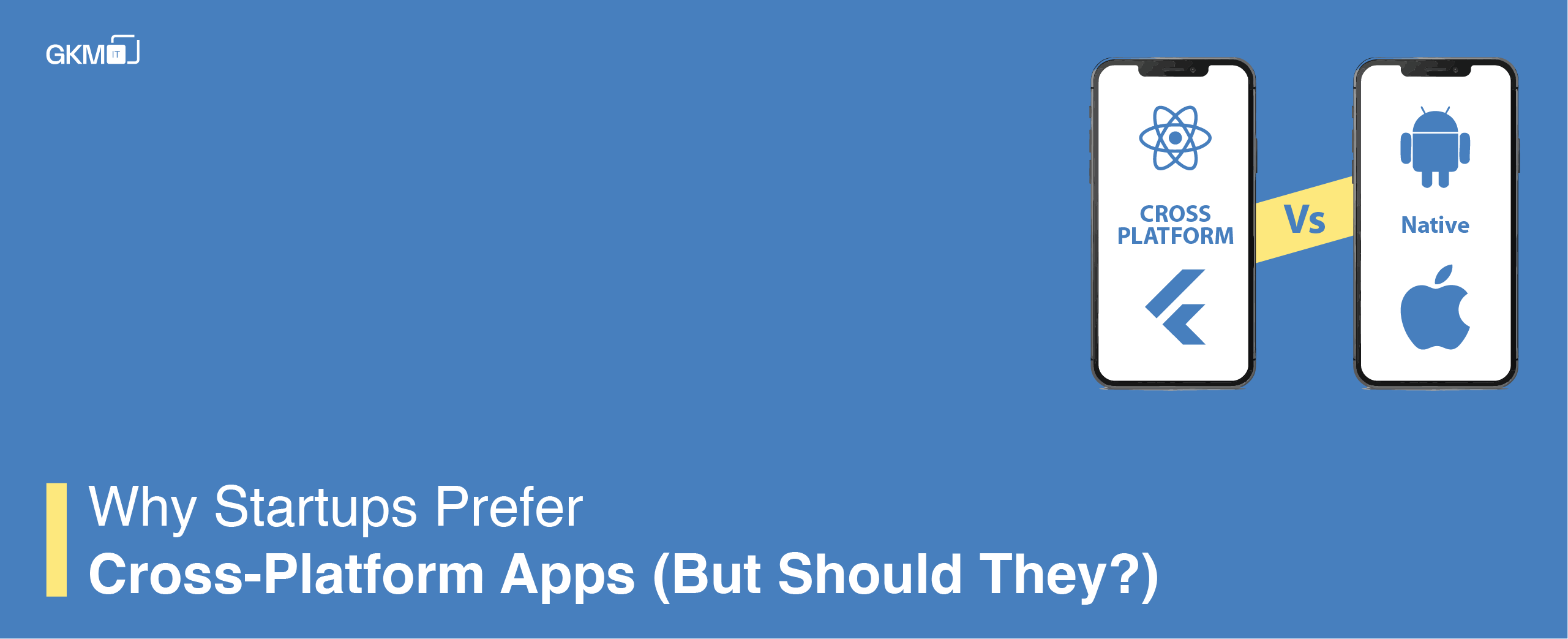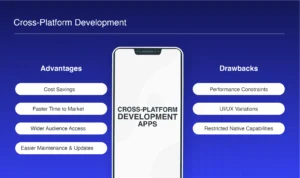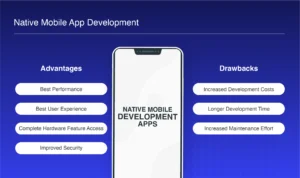
Native vs Cross-Platform Mobile Development: Which One Fits Your App Strategy?
So, you’ve got a fantastic idea for a mobile app development platform. Excellent! But now the age-old question comes: Native vs Cross-Platform Apps? It’s like deciding between a luxury sports car and a go-anywhere vehicle. Both have their advantages, but the best decision is based on where you’re going.
If you’re thinking of going with native mobile app development designed specifically for iOS app development or Android app development, or will you adopt Cross-Platform App Development to strike all the platforms at one go? Let’s divide and help you out with it.
Learning Native and Cross-Platform Development
Think about it this way: if you were building a house, creating a native app development is like building that house ground up with materials designed to be used in that particular region’s climate. This will take time and money; however, if done right, it ends up being a great process in the end.
Cross-platform mobile App Development is similar to taking materials that are already pre-fabricated and designing a house that can be adjusted to several regions. The process is faster and cheaper, but that may mean you will have to make adjustments.
Native Mobile App Development:
- Built specifically for iOS app development (Swift/Objective-C) or Android app development (Kotlin/Java).
- Best suited for apps that require performance (i.e., gaming, AR, and complex animations).
- Full access to device capabilities (camera, GPS, sensors, etc.).
- Costs more but provides an optimally designed user experience.
Cross-Platform Development:
- Uses cross-platform frameworks, such as React Native, Flutter, or Xamarin, to share a single codebase over multiple platforms.
- Quicker development with lower mobile app development cost.
- Generally speaking, it performs slightly less than native mobile app development.
- Easier upgrades and maintenance are much simpler.
We will dive into the timeline to determine which is best for your app.
Cross-Platform Mobile App Development- Advantages and Disadvantages

Advantages of Cross-Platform Development:
Cost Savings: A single team develops one app compatible with Android and iOS, reducing your mobile app development cost.
Faster Time to Market: Utilizing the same codebase means launching is faster, which is essential for competitive markets.
Wider Audience Access: Your app is available across multiple platforms with no additional effort.
Easier Maintenance and Updates: By repairing a bug once, it is repaired across all platforms.
The Drawbacks:
Performance Constraints: Cross-platform apps can be challenged by intricate animations and computationally intensive operations.
UI/UX Variations: Every platform has its own set of design patterns, and a one-size-fits-all design could feel unnatural.
Restricted Native Capabilities: Certain device-specific features might need extra workarounds.
Cross-platform development is a cost-speed compromise and can sacrifice performance, UI continuity, and native features.
Native Mobile App Development- Advantages and Disadvantages

Advantages of Native Development:
- Best Performance: Native applications execute at a higher rate and are more efficient as they are specifically tailored for the targeted platform.
- Best User Experience: It offers an effortless, easy-to-use interface that adheres to platform-specific design standards.
- Complete Hardware Feature Access: Allows deep hardware integration with the hardware features such as GPS, camera, sensors, and fingerprint recognition.
- Improved Security: More secure encryption, improved data protection, and compliance with platform security standards.
The Drawbacks:
- Increased Development Costs: The company needs to have different teams for iOS and Android, which raises costs.
- Longer Development Time: It takes more time to develop two distinct apps than it does to develop a cross-platform.
- Increased Maintenance Effort: Updates, bug fixes, and new features must be applied independently for each platform.
With all these issues, however, native development is still the best option for companies that want high performance, security, and a high-end user experience.
When to Opt for Cross-Platform Mobile App Development
These are situations where cross-platform mobile applications are an intelligent option:
- You are low on budget but need an app for both iOS app development and Android app development.
- Your application doesn’t make extensive use of device-specific capabilities.
- You need to validate your product concept before investing in full-fledged development.
- Speed to market is paramount, and you require quick development.
-
Progress OpenEdge for Cross-Platform Development: When considering enterprise-grade cross-platform software, Progress OpenEdge is definitely worth a look. It offers a robust foundation for cross-platform mobile app development technologies with emphases on:
- High-Level Business Logic: Perfect for handling complex backend systems.
- Cloud and API Support: Supporting increased scalability and connectivity.
- Security and Compliance: Providing enterprise-level security for data-intensive applications.
When to Opt for Native Mobile App Development
These are the situations where native mobile applications are an intelligent option:
- You want fast processing, smooth transitions, and intensive computing.
- You want apps that have complex visuals, 3D graphics, or AR/VR transitions.
- You opt this if your application relies on GPS, camera, sensors, or other device-specific features.
- You want better performance, security, and support for future growth.
Popular Cross-Platform Mobile Development Tools and Technologies
If you opt for cross-platform app development, these are the best tools to use:
- React Native: The most widely used option for near-native performance.
- Flutter: Google’s high-performance UI toolkit with stunning native-like designs.
- Xamarin: This is Microsoft-supported and best for enterprise cross-platform apps.
- Ionic: A hybrid solution with web technologies.
- PhoneGap (Apache Cordova): Excellent for rapid prototyping with web skills.
Popular Native Mobile Development Tools and Technologies
If you opt for native app development, these are the top tools and frameworks to use:
- Swift (iOS): Apple’s own language for creating high-performance iOS apps.
- Objective-C (iOS): An older language that is still used for keeping older iOS apps running.
- Kotlin (Android): Google’s go-to modern language for Android development, with strong features and performance.
- Java (Android): A popular programming language for Android development that is highly relied upon.
- Jetpack Compose (Android): A new library for composing native UI with less code.
Tips for Creating Mobile Cross-Platform Software
Want to get your cross-platform applications noticed? Remember these tips:
- Select the Correct Framework- Every tool for building cross-platform apps has its own strengths; choose accordingly.
- Optimize UI for Every Platform- Users want applications to feel native, so optimize accordingly.
- Test on Actual Devices- Emulators are insufficient; always test on real devices.
- Keep Code Modular- This facilitates updates and scaling much more quickly.
- Use Native Modules When Necessary- If performance is critical, include native components where necessary.
Tips for Creating High-Quality Native Mobile Applications
To provide a seamless and high-performance native app experience, remember the following best practices:
- Adhere to Platform Guidelines- Adhere to Apple’s Human Interface Guidelines and Google’s Material Design to deliver a seamless user experience.
- Optimize for Performance- Take advantage of platform-specific optimizations to deliver smooth interactions and high-speed execution.
- Leverage Native APIs- Achieve maximum efficiency by incorporating platform-exclusive features like Face ID, ARKit, or Google Play Services.
- Assure Cross-Device Compatibility- Test extensively across various screen sizes and versions of operating systems for optimized performance.
- Make Security a Priority- Implement platform-specific security capabilities such as biometric authentication and encryption to safeguard user information.
Challenges in Cross-Platform Mobile Development
Before you bet the farm, think about these challenges:
- Performance Problems: Certain cross-platform frameworks have trouble with intensive animations or 3D graphics.
- UI Inconsistencies: Adjustments are usually necessary to keep the app’s look and feel in sync with platform standards.
- Limited Native Features: Certain hardware integrations are not supported out of the box.
- Security Risks: The app needs to comply with security standards on platforms.
Challenges in Native Mobile Development
Even though native development has benefits, it is not without drawbacks:
- Increased Development Expenses: Support of individual codebases for both iOS and Android means higher expense and effort.
- Longer Time for Development: Development of native applications from the ground up takes time, generally longer than cross-platform development.
- Additional Maintenance Work: Fixing bugs and releasing updates need to be done separately on every platform.
- App Store Approval Process: Native apps have to adhere to rigorous guidelines from the App Store and Google Play, which can cause launch delays.
Require Expert Help? GKM IT Has Got You Covered!
Deciding between native app development and cross-platform development isn’t about features; it is about your mobile strategy serving your business purpose. Whether you require a performance-intensive native mobile app or a budget-friendly cross-platform mobile app, the decision will make or break your business.
At GKM IT, we specialize in developing innovative cross-platform mobile applications as well as native mobile application development. Our team of seasoned cross-platform app and native app developers ensures that your app provides smooth performance, a rich user experience, and a strong backend.
Why GKM IT?
- Specialized skills in iOS app development and Android app development.
- Expertise in cross-platform frameworks like Flutter, React Native, and Xamarin.
- Business-friendly solutions that scale with businesses of any size.
- Complete mobile app development from start to finish with a strong emphasis on innovation and security.
Whether you are a startup testing an idea or an enterprise looking for a feature-rich mobile experience, GKM IT will assist you in selecting the proper mobile app development platform and making your vision a reality.
The Final Verdict: Which Way to Go?
Choose Native Mobile App Development if:
- Your app depends on high performance (gaming, AR, video editing).
- You require in-depth hardware integration (sophisticated camera usage, GPS, sensors).
- You want the optimal user experience.
- Your budget can accommodate distinct iOS app development and Android app development teams.
Choose Cross-Platform Development if:
- You have a tight budget but require apps for both platforms.
- You require quicker development and deployment.
- Your app does not need heavy device interactions.
- You desire more straightforward maintenance and updates.
Ultimately, Native vs Cross-Platform Apps is a compromise between performance, cost, and speed. Make the right choice, and ensure your choice supports your business objectives!
Related Blogs:
How to Choose a Platform for Mobile App Development?
React Native vs Xamarin: What to choose for cross-platform app development?
Top Mobile App Development Frameworks 2025
Mobile App Development Frameworks 2024-2025
Frequently Asked Questions
1. Difference between Cross-platform development and Native development?
Cross-platform development allows apps to run on multiple operating systems using a single codebase, saving time and cost. Native development builds separate apps for each platform (like iOS or Android) using platform-specific languages, offering better performance and full access to device features. Choose based on project goals and resources.
2. Why is cross-platform development gaining popularity?
Cross-platform development is gaining popularity because it has a lower cost of mobile app development, allows for a faster app life cycle, and offers a larger audience for your applications. With cross-platform mobile app development technologies, companies can target iOS app development and Android app development with the same app. At GKM IT, we build great cross-platform apps while ensuring high quality and efficiency without compromising performance.
3. What are the security challenges in cross-platform development, and how can they be addressed?
Cross-platform software is subject to many of the same security risks, such as insecure APIs, data breaches, and platform-specific vulnerabilities. Using cross-platform frameworks can help research security issues and offer built-in security features. If feasible, encrypting your data can mitigate these security risks, and implementing strong authentication can further increase the security of your cross-platform applications. At GKM IT, we believe in security-first development that ensures the cross-platform applications we build meet the highest compliance standards.
4. Why is user experience (UX) design crucial in cross-platform app development?
In cross-platform mobile application development, UX consistency helps maintain consistent navigation across all devices. Poor UX can lead to fewer user retention rates afterwards. Our cross-platform app developers at GKM IT focus on intuitive UI/UX, optimizing appropriate guidelines for the design of one platform to be consistent with a cross-platform mobile application that has a cohesive UX throughout the applications.
5. Can cross-platform apps offer the same performance as native apps?
Thanks to innovations in cross-platform mobile app development technology, apps that are built with cross-platform frameworks like Flutter and React Native can now nearly match native performance. However, native is still preferred for resource-heavy apps. At GKM IT we will optimize your cross-platform app for speed, efficiency, and seamless function.
6. Why should startups choose cross-platform development?
Cross-platform mobile application development is cost-effective and expedites the time-to-market for startups. You can modify your application quickly by using a single codebase for the mobile app development platform. GKM IT assists startups in their development of high-quality, scalable, cross-platform applications, offering speed to market, performance, secure architecture, and cross-device usability while minimizing expenditure.